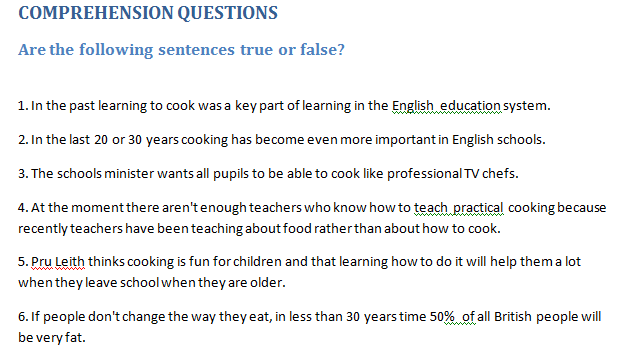BBC
Learning English – Words in the News
Compulsory cooking classes
– 23 January 2008
© BBC
Learning English 2008; http://www.bbclearningenglish.com/
English teenagers are to receive compulsory
cooking lessons in schools. The idea is to
encourage healthy eating to combat the
country's spiralling obesity rate. It's feared that
basic cooking and food preparation skills are
being lost as parents turn to pre-prepared
convenience foods. Jon Devitt reports.
Cooking was
once regarded as an integral part of
education in England - even if it was
mainly
aimed at girls. In recent decades cooking has progressively become a peripheral
activity in
schools. In many cases the schools themselves have given up cooking meals in
kitchens on the premises. But the rising level
of obesity, has led to a rethink
about the
food that
children are given and the skills they should be taught. Ed Balls is the
minister in
charge of
schools.
"What
I want is for young people to be taught how to do basic, simple recipes like a
tomato
sauce, a bolognaise, a simple curry, a stir-fry - which they can use then at
home
and in
their later life, experiment with, discover the joy of food, having got the
basics
under
control."
The new
lessons are due to start in September but some schools without kitchens will be
given
longer to adapt. There is also
likely to be a shortage of teachers
with the right
skills,
since the trend has been to teach food technology rather than practical
cooking. Also
the compulsory lessons for hands on cooking will only be one hour
a week for one term.
But the
well known cookery writer , Pru Leith, believes it will be worth it.
"If
we'd done this thirty years ago we might not have the crisis we've got now
about
obesity and
lack of knowledge about food and so on. Every child should know how to
cook, not
just so that they'll be healthy, but because it's a life skill which is a real pleasure
and we deny
children that pleasure."
The renewed
interest in cooking is primarily a response to the level of obesity in Britain
which is
amongst the highest in Europe, and according to government figures half of all

New vocabulary
ResponderEliminarIntegral: essential, very important
Peripheral: minor, not as important as other things (here, school subjects)
On the premises: in the schools
Obesity: extreme fatness
To adapt: to change so that they are suitable
A shortage of teachers: not enough teachers
Compulsory: something you are obliged or have to do
Hands on: practical, making or doing something with your hands
A life skill: knowledge that you can use all your life, that will help you outside of school
Current trends are not halted: the way that most people (here, British people) are behaving continues